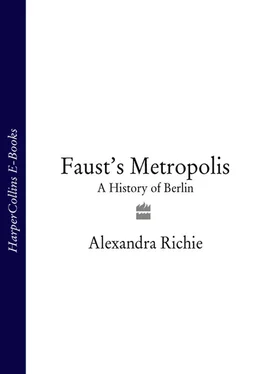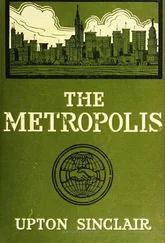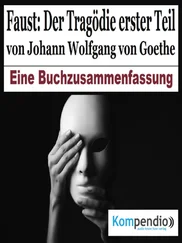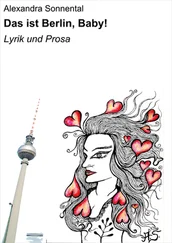Berlin’s location alone will not determine its future foreign policy, but it will play a role. The old cultural and economic ties which made Bonn so accessible to Paris are already working in reverse for Berlin. In the old West Germany the only eastern city which mattered was Moscow. The smaller Warsaw Pact countries were all but ignored and even the GDR was pressured into German – German agreements via Moscow. All that changed in 1989. Suddenly ‘the east’ was on the doorstep: the Czech Republic is a mere two-hour drive from Berlin; Poland is less than an hour away.
Unlike Bonn Berlin has few historic ties with the west but has traditionally always looked to the east, either for commerce or for conquest. Its ancestral hinterland was in Pomerania and Silesia and East Prussia, and Berlin itself was built up largely by labourers from East Elbian regions – in 1911 1,046,162 people moved there from German lands (including German-held Poland) and 97,683 from the Russian empire; in the same year only 11,070 came from France. Trade links with the east have always been strong: by the early 1930s 30 per cent of both Hungarian and Czech trade was with Germany. 41Even before the collapse of the Wall West Germany had been trading with eastern bloc countries; after 1989 it signed bilateral trade agreements with most east and central European countries and quickly established Goethe Institutes throughout the region. True, the West Germans initially treated the three key central European states as little more than a ‘threefold cordon sanitaire ’, a ‘buffer zone’ against surprise attacks from Russia, against Chernobyl-like disasters, and above all against economic migrants from the former USSR. 42But that view has already changed. Today airports, hotels and business centres in Budapest or Gdansk or Prague are packed with German businessmen making deals and discussing strategies for the future; the roads in the Mark Brandenburg are filled with Polish cars heading to and from the border and Polish highways are in turn populated by speedy Germans in their Mercedes and Porsches heading to Poznan or Cracow or Warsaw. According to Bundesbank figures of June 1996 Germany’s trade with central Europe has overtaken trade with the United States and has already reached 80 per cent of its total trade with France. And attitudes between the once hostile nations are changing too. In 1995 Václav Havel called Germany ‘a part of our destiny, our inspiration as well as our pain … some regard Germany as our greatest hope, others as our greatest peril’, but despite deep misgivings on both sides the Czechs and Germans signed a treaty of reconciliation in January 1997. 43But the most extraordinary change has taken place between Poland and Germany. Thanks to the work of people like the ex-Prime Minister Tadeusz Mazowiecki, Senator Stanislaw Stomma and ex-Foreign Minister Wladyslaw Bartoszewski, who is a friend of Helmut Kohl, these once implacable enemies have begun to heal the terrible scars not only of the Second World War, but of centuries of hostility. Cultural events like the 1997 exhibition outlining the historic links between Poland and Saxony organized by the erudite head of Warsaw Castle, Andrzej Rottermund, and held both in Germany and Poland would have been unthinkable a decade ago. 44In a 1997 survey the pollster Lena Kolarska-Bobinska revealed that 77 per cent of Polish businessmen and women liked working with Germans – only 58 per cent liked working with Americans; 74 per cent desired Germans as political partners – 67 per cent cited Americans. And it has been the government of Helmut Kohl which has striven to usher Poland, the Czech Republic and Hungary into NATO, and which has pushed for their EU membership as early as 2005. As he put it in 1994, ‘It is of vital importance for Germany that Poland becomes part of the European Union,’ and this aim has been extended to other countries in the region. 45The effort has not gone unnoticed. Central and eastern Europeans have not forgotten their recent past, but Germans have rarely been so popular east of the Oder – Neisse.
It is in Bonn’s and will continue to be in Berlin’s self-interest to promote stability in central Europe. Any disaster there, whether military, political or economic, will have an immediate impact on Germany which would be all the more acutely felt in Berlin. Furthermore, as the most influential player in the region the new capital will enhance Germany’s claim that it deserves a greater role in international affairs, including a seat on the UN Security Council. Since 1989 Germany’s priority has been to create a western-oriented Europe stretching as far to the east of the Polish border as possible. Berlin’s claims that it is already a vital link, a ‘bridge between east and west’ take on a new meaning when seen in this context; the city seeks to become both the ‘future capital of the European community’ and the capital of Schaukelpolitik – the ‘fulcrum politics’ between east and west. As a working paper prepared by the CDU (Christian Democratic Union) in November 1994 put it, Germany will be the ‘pivotal power in Europe, involved in an eternal balancing act between east and west, seeking to reconcile and integrate. It will do so with one hand still tied behind its back. For it will still be loath to lead, and merely seek to react to the initiatives of others.’ 46
So far this malleable German foreign policy has been a success. The nation was fortunate that unification took place during a period of relative stability and peace. True, its first foray into international politics in the form of the hasty recognition of Croatia and Slovenia proved to be a disaster, but since then there have been no other major crises. 47The United States remains a close and trusted ally. Unlike the French or the British, the Americans were positive about German unity from the beginning; it was George Bush who overruled other western leaders and advocated reunification, while Bill Clinton has let it be known that Helmut Kohl is his key ally on the continent. As if to give credence to this strong bond Henry Kissinger said in 1994, ‘I consider Kohl one of the seminal leaders of our period. He has been a guarantee of Germany’s Atlantic and European orientation and a shield against the nationalistic or romantic temptations from which his people have suffered through much of modern history.’ 48Kohl, now the longest ever serving German Chancellor, has not been nicknamed the ‘Bismarck of the Twentieth Century’ without reason. Furthermore the Americans have assumed Germany’s historic role of supporting Russia, leaving Germany free to pursue its interests in central Europe and in the west. It seems that Berlin’s first years as capital will be marked by a delicate balancing act between the United States, western Europe, east central Europe, Russia and other regions. But what will happen after Helmut Kohl’s departure? What will the situation be in five or ten years’ time? And what kind of legacy will Berlin look back on when it celebrates its first centenary as capital of the ‘Berlin Republic’?
Konrad Adenauer referred to any attempts to deviate from the western Uberai democratic tradition as ‘experiments’ which were to be avoided at all costs. The strength of post-war Germany resulted from its strict adherence to the Anglo-American model of government, which was nurtured in the new Federal Republic by the western Allies. It resulted in a democracy which was stable precisely because concern for the political, economic and general well-being of its citizens was put before self-aggrandizement or aggressive wars. Berlin owes a great deal to the United States, from its rescue during the blockade to support over the reunification of Germany. One hopes that Berlin will continue to look westward, retaining the United States as its primary ally, and will not succumb to the cheap anti-Americanism which permeated West Berlin in the 1970s and 1980s. Given the crucial role played by President Bush it is pathetic to see the likes of Willy Brandt’s widow Brigitte Seebacher-Brandt, Heinrich Lummer, Klaus Rainer Röhl (at one time a Communist married to a Red Army Faction terrorist leader) and others of the so-called ‘generation of 1989’, or the members of the ‘New Right’ attack the United States and portray the ‘Bonn Republic’ as a rather unfortunate episode which destroyed German national pride or made the Germans ‘too western’. 49The road away from the United States is the road to disaster.
Читать дальше












